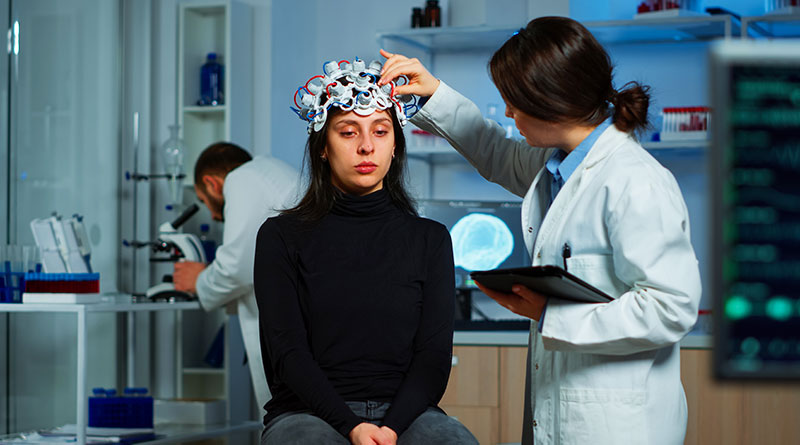Artificial Intelligence has been a powerful instrument in transforming the field of mental healthcare and changing the way mental illnesses are seen, identified and addressed. Artificial Intelligence (AI) is being used in digital mental health care through chatbots and virtual assistants to provide virtual therapy and support, as well as predictive analytics, personalized treatment suggestions and accurate diagnosis through machine learning algorithms that analyze big datasets.
AI has the great potential to completely transform the way mental healthcare is delivered, as per a recent World Health Organization (WHO) study on the applications and difficulties of Artificial Intelligence in mental health research.
In particular, artificial intelligence (AI) in mental health is a quickly developing topic with infinite promise to transform the way we identify, address and manage mental health issues.
AI-assisted treatment would be able to reliably identify mental health problems early on and offer assistance without social guilt. Artificial intelligence therapy tackles the worldwide scarcity of mental health professionals and provides efficient therapies for issues blocking human contact. This is a real world that artificial intelligence is helping in shaping, not a fantasy.
Here, we hope to clarify how artificial intelligence (AI) can be appropriately used to transform mental healthcare. This promises the maintenance of personal freedoms and the fundamental human element. Let’s examine more closely at how artificial intelligence is changing the field of mental health.
Benefits & Applications of Artificial Intelligence in Mental Health
Multiple plans exist for using Artificial Intelligence in mental health to improve diagnosis, treatment and care. Let’s discuss some of the most promising applications of Artificial Intelligence in mental healthcare.
AI Chatbots
To what extent would you feel better at ease discussing your most intimate and private feelings with a robot as opposed to a human?
Chatbots are being used more and more to provide mental health patients with guidance and a channel of communication as they receive treatment. In addition to offering support in managing symptoms, they can search for terms that may lead to a referral and direct communication with a mental health practitioner.
Woebot is an example of a therapeutic chatbot of this type. It can guide users through various therapies and talking exercises that are typically used to assist patients learn to manage a range of diseases. Woebot is trained to adapt to the personalities of its users.
Another chatbot, Tess, can be used to help manage anxiety and panic episodes whenever they happen. It provides free, round-the-clock, on-demand emotional support.
Early Detection and Diagnosis
Artificial intelligence is able to identify mental health issues in their early stages by examining huge data from social media, wearable technology and electronic health records. By seeing patterns and abnormalities that may indicate the start of conditions like schizophrenia, depression or anxiety, artificial intelligence (AI) powered EHR Software Development facilitates timely intervention.
AI-powered mental health apps can prevent disorders from worsening and promote early, typically more effective treatment by taking preventative measures. The burden on healthcare systems is also reduced when users are given the opportunity to remedy these problems before they worsen.
Improving Patient Engagement
Healthcare firms are using artificial intelligence (AI) into their patient engagement initiatives to enhance the patient experience. AI chatbots are employed to make access to care as easy and frictionless for assisting users in managing their mental health disorders. Conversational AI is being used by healthcare organizations to handle phone calls, schedule appointments, provide patients directions to the provider and provide health education.
AI technologies are also used in mobile applications and reminder systems to help track a patient’s adherence to treatment or medicine, improve communication with the patient and educate them about the importance of this adherence. For instance, to improve the way therapy sessions are conducted and get greater insight into effective communication, the AI platform Lyssn may be used to evaluate recorded therapy sessions and analyze elements such as tone and voice patterns from both parties. The technology can recognize both positive and negative speech patterns, provides mental health care providers with immediate feedback on their abilities and tool recommendations to enhance their clinical work.
Wearables
Some AI mental health solutions work as wearables that can interpret body signals using sensors and intervene to offer support when needed, instead of waiting for a user to interact with them through an app.
Biobeat gathers data on heart rate variability, physical activity and sleeping habits, which is then utilized to evaluate the user’s emotional and mental states. When intervention might be required, this data is compared with aggregated data from other users to provide predictive warnings. Users can then decide whether to change their behavior or, if they think it’s necessary, seek help from healthcare providers.
Increasing Patient Compliance
Ensuring patients follow their prescribed treatment regimen is one of the most difficult sides of treating mental health disorders. It includes taking their medicine and attending therapy sessions.
AI can notify healthcare staff to allow physical interferences or send reminders. This can be done using automated phone calls, emails, SMS and chatbots. Additionally, algorithms can recognize behavioral patterns or events in a patient’s life that lead to non-compliance. Healthcare professionals can then use this knowledge to collaborate with the patient to devise strategies for avoiding these challenges.
Personalized Treatments
Using AI to provide customized solutions for various mental health issues is one fascinating study. AI has been used to track side effects and symptom responses to generate insights that can modify treatment regimens for each patient. In one study, computer vision analysis of brain scans was used to create individualized treatment programs for children with schizophrenia at the University of California, Davis.
The research’s focus on “explainable AI” is crucial; i.e., the algorithms must make sense to medical practitioners who are not experts in AI.
Virtual Reality Therapy
Virtual reality (VR) and artificial intelligence (AI) have opened up new therapeutic options for illnesses like PTSD and phobias. It includes exposure therapy and desensitization. With virtual settings, likely real-life scenarios can be customized. People can confront their concerns in a safe environment with therapeutic support through the use of virtual retail therapy.
Reduce Anxiety and Depression
Artificial intelligence that has undergone clinical validation has the ability to reduce anxiety and depression symptoms by forming a therapeutic bond just like a human relationship. It has been demonstrated that AI-led help can reduce symptoms while handling 80% of the support workload, freeing up human resources for areas that truly require it.
Wysa’s AI-first method can improve depression and anxiety scores by an average of 31%. It helps workers to take better care of their mental health before symptoms worsen by identifying each person’s needs and guiding them via interactive cognitive behavioral therapy (CBT) exercises.
Predictive Analytics
With continuous monitoring of multiple variables, AI systems can forecast probable breakdowns in mental health. It includes medical and behavioral data, voice recordings from phone calls, social media data and other data sources. Therapists can proactively modify treatment regimens and lower the chances of setbacks. Research shows machine learning (ML) can accurately detect and categorize various mental health issues, such as depression, schizophrenia and even suicidal ideation. Research is also being conducted to identify the people who are most likely to experience future mental health issues.
Artificial intelligence (AI) methods are also being utilized to identify patients who may benefit from reduced or no medication because they are more likely to react favorably to cognitive behavioral treatment (CBT). Due to the fact that all drugs have side effects, patient outcomes in such circumstances can significantly improve.
Conclusion
Through the use of AI in data analysis, self-assessment and therapy, patient interaction and workflow automation, the field of mental healthcare is changing. AI is emerging as a vital partner in the chase of affordable, efficient and compassionate mental healthcare due to its growing accuracy in risk assessment, ability to customize treatment regimens and enhancement of patient experiences.
To create innovative AI solutions that could greatly improve mental health results, get in touch with a leading healthcare software development company.
Sahil Sachdeva is the Founder of curemedoc.com and a Digital Marketing professional with years of experience. If you need help in Content writing and want to increase your website ranking, connect with him, as he has some premium websites where you can share blogs with DoFollow links and increase your website’s ranking on Google.





